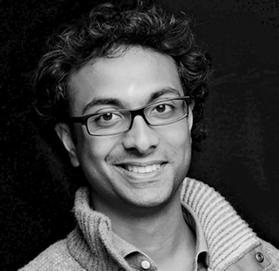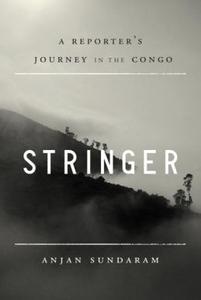
|
|
| photo: Antonio Gamito | |
Anjan Sundaram is an award-winning journalist who reported from Central Africa for the New York Times, the Associated Press and Foreign Policy. After graduating with a Master's in mathematics from Yale, Sundaram turned down several job offers to work as a stringer for the Associated Press. His nonfiction debut, Stringer: A Reporter's Journey in the Congo (Doubleday, $25.95), offers a visceral and poignant account of his apprenticeship as a writer immersed in the violent conflicts of Congo.
You left a promising mathematics career as a Yale graduate and a lucrative job offer to become a stringer with the Associated Press. Can you explain your thoughts and feelings at the time? Did your family and loved ones think you had gone crazy?
I had been for some time living in the mathematical worlds I studied. It was magical. But both mathematics and finance seemed too abstract. I think neither would have satisfied this lust I felt at the time to experience the world in its fullness and rawness. I had heard that the war in Congo had left millions dead, but that only a couple of journalists were there to cover the country, which is half the size of Western Europe. The advice from my family and loved ones was often that I was needlessly endangering my life or wasting my time, that I could be doing more productive things. But I felt a desire to see the powerful events occurring in Congo, to somehow touch them and allow myself to be touched by them. It was a complement to my mathematical life at the time, which was largely intellectual, even imaginary.
Was there something in your background that made you feel equipped to succeed as a reporter?
I had nothing more than a desire to see the world and write about it. My training in abstract algebra had taught me about building logically consistent systems--and some of that translates to storytelling. But talents take you only so far. More important was my determination to become a reporter--my sense that this was my vocation. Then there was really no turning back from it. I had to try everything to learn.

I went to Congo on my own initiative. I applied for a visa and bought a one-way ticket. I had no job or connection to the place, no family or history there. I wanted to cover its war. I had read stories about famines, massacres, great loss, and I felt these stories merited a more sustained treatment than I found in newspapers. I also came upon an interview with the great Polish reporter Ryszard Kapuscinski in which he lamented the lack of witnesses to the great African events of his time, which he described as history in the making. And, finally, while I was paying my final bill at Yale, the cashier happened to be African. I asked where she was from and she said Zaire. She could not believe I wanted go to Congo after such an expensive education--she felt I was throwing so much away. But in the end she relented and had me stay with her in-laws. It is thanks to that family, despite various troubles that ensued, that I was able to remain in Congo and report on the country.
You ended up staying with a Congolese family instead of at a motel or some other living arrangement. Do you think this affected your reportage and your understanding of the people there?
It's easier to judge people when you sit outside society--whether in another country or in the same city in a motel. Staying with a Congolese family made me a part of the fabric of that house, of that street and of society. I lived their experience as much as I could. They ate once a day, so I did the same. We suffered power and water cuts together. If there was a coup or a battle and the roads were blocked, we would be equally affected. None of us would be able to escape. I observed at a minute level the family's daily struggles: in procuring food and medicine for their children, in paying the rent, in finding some measure of dignity. It certainly put my work in context, and in the end much of Stringer was not about the stories I covered or who I interviewed, but about the realities of Congolese life I learnt from living with that family.
Your trip upriver seemed to be a real turning point in your reporting. Was that your perception at the time?
That trip was a product of the spirit with which I had gone out to Congo: I had gone out looking for a story, trusting my instinct and my ability to find something, and once in Congo I again set out upriver, seeking a mine hidden in the jungle that belonged to an Indian businessman. That particular journey was a turning point because it was the first instance in which my spirit to seek came good. I was able to find a story that no one else had reported. I was, for the first time, not merely reporting news that had happened--like deaths in a plane crash--but that I had found. This is a more natural way of reporting for me and, ultimately, it tells you more about the country, because what you find becomes part of your own story and the instinct that got you to that point would naturally propel you further.
Are there travel writers or reporters you would consider as influences?
As I mentioned, Kapuscinski was an influence--both in his method of working, using the wire reporting job to get himself to interesting places and events, as well as in his way of perceiving the world. He had a way of making delimited events and experiences resonate in larger ways. V.S. Naipaul was also an influence--for the incisiveness of his observation and the precision of his writing. And Bruce Chatwin, for the fullness with which he engaged the world and his beautiful spirit.
Was the level of violence, lack of infrastructure and ecological rape you encountered in the Congo ever more than you could bear?
The intensity of my experiences--and my desire to try to go to the root of them--meant that I had to build something of a shell around myself while in Congo. I sought to bear witness, and this was not always pleasant. Only when I left the country did the full weight of my experience hit home; I needed somehow to process it. This emotion, this sense of the intensity of what I had experienced, gave me the initial impetus to begin to want to write Stringer.
War journalists like Sebastian Junger and Chris Hedges have spoken of the addictive rush they get in dangerous environments. Can you relate?
I don't feel it as an addictive rush. Each time I go to these places I have to force myself; it is not something that comes naturally to me. I don't feel at home in dangerous environments. Often I wish I had not come. But there is something that drives me to visit dangerous places--mostly, a feeling that no one else is there, that what people are living through and experiencing is going unrecorded, and may be forgotten. I think it is unbelievably important and powerful simply to bear witness.
You kept reporting after many others had fled Kinshasa. What was your motivation for staying?
I had a sense that something might happen after the elections, that the loser at the polls would not take it easily. I suppose I had a truer intuition because I was one of the few journalists--stringers--who lived and worked in the country, whereas most of the others were correspondents who had flown in for a few days to report on the vote. Congo was my home at that point. It would have been difficult for me to leave. I might have asked myself why I had come in the first place. --Donald Powell, freelance writer

